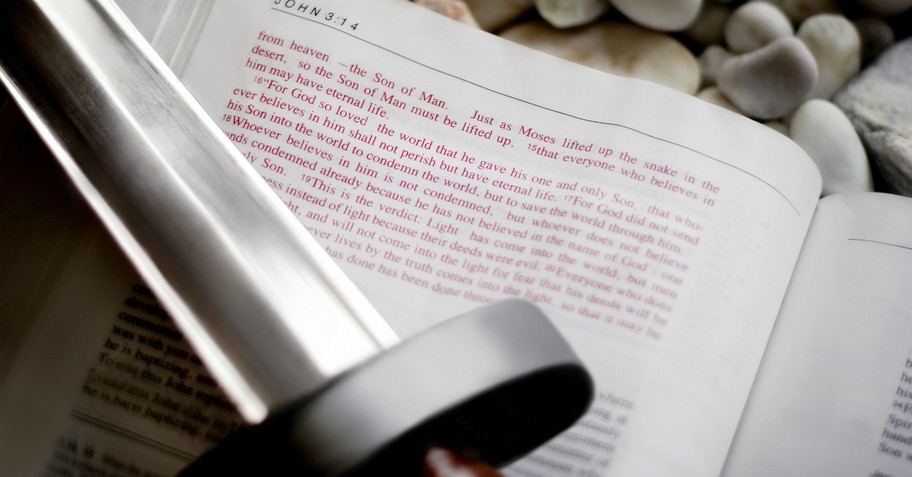Why Did Jesus Say to Grab a Sword?

“But I tell you, love your enemies and pray for those who persecute you.” - Matthew 5:44
“Put your sword back in its place,” Jesus said to him, “for all who draw the sword will die by the sword.” - Matthew 26:52
“You have heard that it was said, ‘Eye for eye, and tooth for tooth.’ But I tell you, do not resist an evil person. If anyone slaps you on the right cheek, turn to them the other cheek also. And if anyone wants to sue you and take your shirt, hand over your coat as well. If anyone forces you to go one mile, go with them two miles. Give to the one who asks you, and do not turn away from the one who wants to borrow from you.” - Matthew 5:38-42
Love. Non-violence. Forgiveness. These are just a few words used to describe Jesus. So it seems a bit shocking to read this in Luke 22:36:
He said to them, “But now if you have a purse, take it, and also a bag; and if you don’t have a sword, sell your cloak and buy one.
What is happening here? Why does Jesus now all of a sudden tell his disciples that they need to sell their clothing and go buy a sword? Is it for self-defense? Does it have a different meaning here? Should we be grabbing for our swords today?
Photo Credit: ©GettyImages/B-C-Designs
What Is the Context of Luke 22:36?
In Luke 22, Jesus institutes the Lord’s Supper. And after this supper, he gives some instructions to his disciples before they go out to the Mount of Olives. By the end of the chapter, Jesus will be betrayed by Judas and arrested. Verse 36 is part of Jesus’ farewell address to his disciples. He is warning them of the difficulty of the days ahead.
In Luke 9 and Luke 10, Jesus sent the disciples out. On those occasions, he told them not to take anything with them. And as they went out, they did not lack a single thing. That is Jesus’ point in Luke 22:35; God had provided for them.
But what are the means that God used to provide for them? If you look back at Luke 9 and 10, you see that what happened was that a person of peace, typically a Jewish kinsman, opened their home to the disciples. It was the hospitality of their fellow Jewish people that allowed the disciples to do this ministry in the name of Jesus.
But now the times have changed. What one thinks of this Jesus of Nazareth is about to divide the nation. The religious leaders and many others are no longer going to view Jesus as a misguided teacher. He will be seen as a dangerous insurrectionist. He will be viewed as a blasphemer who is cursed by God. As such, those who are now affiliated with Jesus should not expect to receive hospitality from their countrymen—but rather rejection.
That explains why they need to take a knapsack and money. But why do they need to take a sword? Is this for self-defense? Is this to keep themselves from being persecuted? Is this to fight against Rome or other leaders? There have been a few suggested answers to these questions.

Were These Swords to Get Arrested?
One of the more interesting explanations of Jesus’ command to buy a sword is that he is doing this precisely to get arrested. The idea is that when Jesus quotes Isaiah 53:12 in verse 37, he is saying that he must be numbered among the transgressors. One way to make this happen is to have his followers walk around with a couple of swords. So, when the disciples come to him in verse 38 and say, “here are two swords,” Jesus responds, “That is enough” (as in, “That is enough to get me arrested”). This is how Phil Ledgerwood explains this option:
Now, he’s asking his disciples to buy swords. Why? Because, at least as far as Luke’s text is concerned, he has to be associated with criminals (presumably so that he’ll be arrested) and his disciples carrying weapons around will do the trick. And they scrounge up a couple of swords, and that’s good enough to make it work.
The idea, then, is that Jesus’ use of the swords is to make him be perceived as lawless. When the religious leaders and authorities come with Judas leading the way, they need to be doing something to get them in trouble. So, the disciples are enacting a drama where they are pretending to be insurrectionists so that Jesus is “numbered among the transgressors.” Peter, just happened to get a little carried away.
This is an interesting view, and it certainly would explain why Jesus tells them to buy a sword, but at the end of the day, it does not seem to do justice to what is taking place in Isaiah 53 or even Luke 22. Judas is leading the authorities to Jesus because they already want to arrest him. In their mind, as a blasphemer, he is already numbered among the transgressors.
The “for” in Luke 22:37 is functioning not as an inspiration to pretend to be transgressors; it is functioning as a prophetic fulfillment of what is happening. The reason they must take knapsack, moneybag, and sword is because Jesus is now considered a transgressor. But that still doesn’t explain why they need to buy a sword.
Photo Credit: ©iStock/Getty Images Plus/pamela_d_mcadams
Is This What Jesus Meant in Matthew 10:34?
Another option is to say that Jesus means exactly what he says, and the time for turning the other cheek is over. This is the time for the disciples to bear the sword. Those who adopt this view would look to Matthew 10:34 as a warrant. There Jesus told his disciples, “I did not come to bring peace but a sword.”
This “sword” then in Luke is symbolic of Jesus’ rule and reign. It is a symbol to the disciples that the times have changed. They will now need to engage in self-defense. They value life, and they value gospel proclamation; therefore, it must be defended even if at the edge of the sword.
But is this what Jesus is saying? Is that even what Matthew 10:34 means? At times the sword is a reference to the Word of God. The metaphor there is that the sword divides. It splits in two. It causes a division. That is what Jesus is saying in Matthew 10:34. He will be the dividing marker for all of the world. You are either “in Adam” or “in Christ.” So, when Jesus says this in Matthew 10:34, he’s not talking about a literal sword.
But what about self-defense? That doesn’t seem to fit either because of what happens immediately after this. In Luke 22:49-51 when Peter lops off the ear of one of the Roman guards, Jesus rebukes Peter and heals the man. If Jesus was asking them to defend themselves, not only would two swords be puny resistance, it would be strange for him to rebuke Peter on the first opportunity for self-defense.
No, this purchasing of a sword isn’t about self-defense either.

Are We Overcomplicating This?
We might be helped by asking an important question of verses 24-46. Why does Luke tell us this story about the disciples fighting, their sifting, and Peter’s falling? Why does he tell us about the disciples falling asleep when Jesus asked them to pray? It’s simple. Luke is showing us that Jesus must do this alone. He alone can save, and so he must endure the passion by himself.
In order to get us there, we need to see the inadequacies of the disciples. We need to see some of their boneheaded responses to Jesus and their total misunderstanding of His message. This is why they are arguing only moments after Jesus’ teaching them about self-giving love. And it is why they come to Jesus with a couple of swords when he wasn’t talking about armed resistance.
I take the “It is enough” as a rebuke. I think Joel Green is correct here:
In v 38, then, the apostles manifest their dullness when they suppose that Jesus opposes his own extensive and emphatic teaching by encouraging them actually to possess (or to purchase) weaponry. His words, “It is enough!” are an expression of his exasperation.
Jesus’ point about the sword is connected with the money and the knapsack. It’s simply a way of communicating to them, “you’re going to be on your own.” He’s not communicating wartime. Nor is he even talking about armed resistance. He’s not even really talking about money or knapsacks or swords. He’s talking about the changing climate. They are moving from a time of “in season” where the fields are ripe for harvest to a time “out of season” when mentioning the name of Jesus will cause you to be dragged before the synagogue.
Buying a sword doesn’t mean you fight your way into the kingdom, no more than the disciples arguing about who is the greatest will merit them the kingdom. It’s another place where the disciples miss the nature of the kingdom. They hear Jesus talk about swords, and they take him literally and go and produce a couple of swords because they don’t understand the nature of His kingdom.
Photo Credit: ©GettyImages/Design Pics
Conclusion
The way to apply a passage like this is to understand that it is specific instructions given to specific disciples. But in this, there is a universal principle. There will be times when the message of Jesus might be more well-received. There are times when folks value and put a premium on the fruit of the Spirit. There are times when our “winsomeness” as disciples of Jesus will be appealing. And there are times when we’ll be “numbered among the transgressors.”
Quiet integrity isn’t going to “work” when the crowd is hell-bent on releasing Barabbas. But surrendering that integrity is never worth it. Follow Christ in the crucifying moments and the resurrecting ones.
People tell us these days that the fruit of the Spirit, sermon on the mount type of Christianity won’t win our nation back. We need the sword. We need to fight. We need to stand. We need to be warriors, soldiers for Christ, and at times we might need to get a little mean, get a little dirty, and do some things in this war that we may not do in peacetime.
That sounds heroic. But it’s not heroic to disobey your commander. Your foot-washing commander. He washed Judas’ feet. This is what we are called to.
We follow the way of Christ in the “in season” and the “out of season” moments. Why? Because Jesus and Jesus alone brings the kingdom.
Sources:
Joel B. Green, The Gospel of Luke, The New International Commentary on the New Testament (Grand Rapids, MI: Wm. B. Eerdmans Publishing Co., 1997), 775.
Originally published October 24, 2022.








